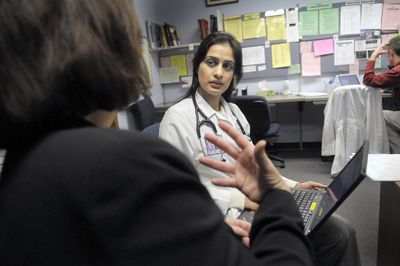Local medical community doing its part to treat AIDS
Spokane clinic specializes in caring for those with the disease

It all started one day on the job. It was 1993, and Mary, a woman in her mid-20s, was working in a Seattle-area lab when she accidentally pricked herself with a needle.
She reported the accident to a supervisor and took a blood test later that day as part of her employer’s protocol. The test came back negative, and she soon returned to work.
But the needle prick set in motion a microscopic revolution inside Mary’s body. The needle delivered fluid alive with the human immunodeficiency virus, or HIV.
It wasn’t until eight weeks after Mary’s accident at work, during a camping trip, that things went terribly wrong. She fell ill. Her temperature soared to 106 degrees, and she had to be whisked to a hospital where new tests were run. She learned she had been infected with the virus that causes AIDS.
Mary is now a member of Eastern Washington’s growing population of about 750 people living with HIV/AIDS. More than 930 people in Idaho are living with HIV, according to the Panhandle Health District.
Health statistics show a troubling trend as people gather today to commemorate World AIDS Day: HIV infection rates are on the rise among young people in the United States. These people are a generation removed from the AIDS scare of the 1980s and early 1990s, when infection often meant a slow, agonizing death.
Around the world, AIDS has led to the deaths of 25 million people. Last year, 2.1 million people died of illnesses that ravaged bodies whose immune systems were diminished by the virus.
In Spokane, the medical community is taking steps to improve care for people with HIV/AIDS. Internal Medicine Residency Spokane just launched a program targeted toward patients with the disease. The HIV clinic, staffed by seasoned physicians and nurses, is also a training ground for doctors completing their University of Washington medical school residency requirement.
Clinic director Dr. Mary Noble said the program that will deliver personalized care for HIV patients also benefits the doctors in training, who in future private practice likely will be treating people living with the disease.
“This kind of training and care seemed like something we needed in this community,” she said.
Debbie Stimpson, a physician assistant and HIV specialist running the program, said the clinic has fewer than a dozen patients with HIV, but could handle as many as 200.
“We’re ready to grow and offer help,” she said.
Sandeep Atwal, a third-year medical resident at the clinic in the Fifth and Browne building, is among 21 physicians in the program completing their training. When finished she plans to return to Seattle and eventually work in an outpatient practice. The Spokane clinic will be good experience in working with a group of patients who, because of advances in drug therapy, are living longer, more normal lives with the disease, she said.
“Understanding their needs and expectations and then helping them manage their health to achieve those goals has been really helpful to me,” Atwal said. “I think all of us in the residency program feel that way.”
Mary, who was infected with the AIDS virus at work, said she takes a daily drug cocktail to control the disease. For 15 years she has been able to keep her infection from turning into full-blown AIDS, but she has to live with nasty side effects from the drugs.
She has gained more than 70 pounds, much of it displaced fatty tissue that has formed into a hump on her upper back and around her trunk. She battles nausea and fatigue, and sometimes stumbles when she walks because of a painful condition called peripheral neuropathy.
“This has not been fun and it’s not pleasant,” Mary said recently. With HIV rates among young people on the rise, “I want young people to know that just because there’s drugs doesn’t mean that those of us living with HIV are OK,” she said.
Janet, a Spokane woman who lost her husband to AIDS nine years and now lives with the disease, cautioned that although medications work, they aren’t a guarantee.
She described a life of caution, stigmatism, expensive medications, and complicated if not compromised love.
“I pray one day that there is a cure,” she said.